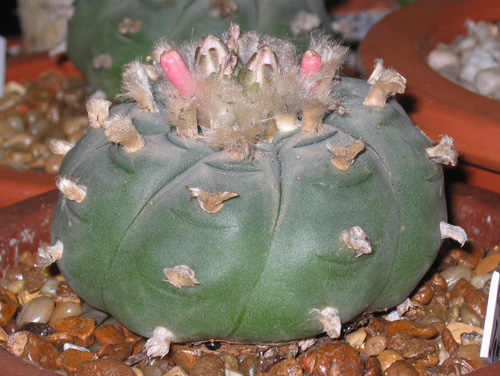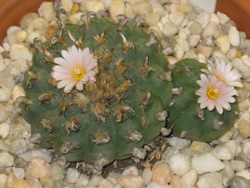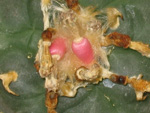|
Lophophora and the Law
In Canada: Drug laws in Canada
fall under the Controlled Drugs and Substances Act- this was recently
instated in 1996 replacing the Narcotics Control Act. One of the
major differences between these acts relates to peyote. In the
Controlled
Drugs and Substances Act, ( the new one) Mescaline is
listed as a schedule III drug. This is exactly how it is written
out in the act.
17. Mescaline (3,4,5-trimethoxybenzeneethanamine)
and any salt thereof but not peyote (Lophophora)
So there you have it... Peyote is exempted
from the act [1] -
it is legal in Canada!! Regardless of recreational, religious
or whatever use you want. There are no conditions on possessing
or cultivating it.
International
Article
32 of the Convention
on Psychotropic Substances allows nations to exempt certain
traditional uses of peyote from prohibition:
In the United States federal law
and many state laws protects the harvest, possession, consumption
and cultivation of
peyote as part of "bonafide religious ceremonies" (the
federal regulation is 42
USC §1996a, "Traditional Indian religious use of the
peyote sacrament," exempting only Native American use, while
most state laws exempt any general "bonafide religious activity").
American jurisdictions enacted these specific statutory exemptions
in reaction to the U.S. Supreme court's decision in Employment
Division v. Smith, 494
U.S. 872 (1990), which held that laws prohibiting the
use of peyote that do not specifically exempt religious use nevertheless
do not violate the Free
Exercise Clause of the First
Amendment. Although many American jurisdictions specifically
allow religious use of peyote, religious or therapeutic use not
under the aegis of the Native
American Church has often been targeted by local law enforcement
agencies, and non-natives attempting to establish spiritual centers
based on the consumption of peyote as a sacrament or as medicine.
The latest example set force in the United States of America as to how the feds treat honest citizens when suspected of dealing with this amazing plant. Just click the link below to check out the horror story!!
Jon Sloan and his Fight against the Illegal Raid on His Lawful Business
Another Example American based case.
"An unusual case of harassment under the Drug Control Act took place in
Grand Forks, North Dakota, in October, 1984, when a white couple, Mr. and Mrs.
John D. Warner, were arrested by the FBI for possessing peyote, a controlled
drug. The two were members of the NAC of Tokio, North Dakota, and had been
for a number of years, and Mrs. Warner was custodian of the supply of peyote
for the Tokio congregation. The FBI had learned of the possession of peyote
by the Warners from the president of the NAC of NA (North America) Emerson
Jackson (Navajo), so it was he who brought them to trial. Jackson said that
they were not bona fide members of the NAC because they were not Indians. He
maintained that in 1982 a motion had been passed by the NAC of NA to the effect
that membership in that organization be limited to persons with one-quarter
Indian blood, thereby excluding this white couple. A jury in Grand Forks Federal
Court found the defendants innocent of breaking the law, since they were able
to prove that although they were not Indians, nevertheless they were members
in good standing of the local congregation of peyotists. The charges were dismissed.
This case not only illustrates harassment under the Drug Control
Act, but it also brings up the legality of non-Indians as bona
fide members of the NAC. From the beginning, attendance of non-Indians
to peyote meetings has been a somewhat personal or tribal matter.
For instance, very early in Oklahoma some Caddo refused to allow
non-Indians to attend any of their meetings. But others, such as
the Kiowa and Comanche, welcomed non-Indians, black or white, as
long as they were seriously interested. With the formation of the
NAC, the same attitude has generally prevailed, and the presence
of non-Indians has been no problem. It was in the sixties when
the hippie generation became interested in peyote and became a
nuisance in the peyote gardens of Texas, bringing about the Texas
law which forbids possession of peyote by persons not having one-quarter
Indian blood and proof of membership in the NAC, that race became
an issue in membership. Since then, if non- Indians wish to be
allowed to possess peyote, they must show that their involvement
in the peyote religion is genuine -that is that it is not just
a recreational, frivolous, or passing interest but a real commitment.
Then, as the case against the Warners shows, race is not an issue.
Still, it is especially important for non-Indians to carry identification
of membership in the NAC if they have occasion to carry peyote,
and even so, non-Indians possessing peyote violate Texas law.
The ruling of the NAC of NA that only Indians should be enrolled
in the Native American Church is new and is not shared by most
peyotists. The NAC of NA does not speak for all peyotists, as much
as it would like to do so. All peyotists consider themselves members
of the Native American Church, but most are not affiliated with
the NAC of NA. Each congregation makes its own rules, just as each
meeting is conducted by its own roadman.
Today there are many peyote churches which
have little to do with the NAC of NA. Some are large with wide
jurisdiction; others are a single congregation."

email: dr_frank @ magicactus.com
Mailing
address:
Frank
Valente
MagiCactus.com
56 Dewhurst Blvd.
Toronto, Ontario
M4J 3J3
© 2008, Frank Valente |

